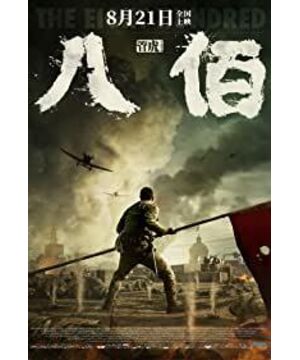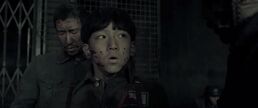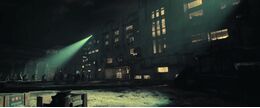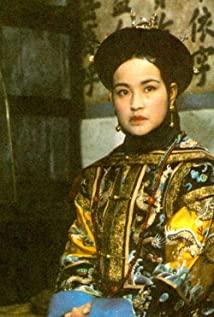As far as the existing version that can be seen by the general public is concerned, the beginning of the story begins with a small animal in the geographical environment, that is, the cute voles go out of the hole and enter the hole, which belongs to a common general symbolic designation. The reason for this is of course because Guan Hu has always liked the so-called "authority" that various animals refer to, and it is also obvious that there is another animal symbol throughout the whole article - white horse, after this group of soldiers in the army. Blind as I can see, a motley army composed of non-military men who were dressed casually and obviously non-military entered the bombed Shanghai city, where they could only fight in the streets. They ran into the Japanese army without any precaution and were slaughtered. Then Director Guan Hu miraculously The clip is omitted, the screen goes black, and when it lights up again, it means that the National Army is shooting and killing off-brand deserters and "escapers". The regular army retreats along the concession, and then the screen goes black again. When it lights up again, Ou Hao, Xiaohubei When I waited for people to go to the Sixing Warehouse, the editing and omission of this paragraph were actually within the scope of understanding. After all, it was just to explain the background, but the brutality of beheading and shooting has left some wounds on my young mind.
However, on closer inspection, this prelude still caused some minor problems. First of all, why do these rogue troops who farm and farm come to Shanghai, which has become the front line of the fire? Let's assume that the first situation is that they came voluntarily, which is basically equivalent to suicide in fact. We also know from the follow-up plot that Wang Qianyuan, who is a veteran, and Ou Hao, who wants to see the world, may have come voluntarily. The army is obviously not certain; the second situation is that they were forced to come here. For a group of rogue soldiers who have no formal military training, this is basically homicide. Of course, Wang Qianyuan and Ou Hao, who want to come, must be excluded. It's still half way through. As for the possibility of Scenario 1, I can’t help but ask, Shanghai, which has always been responsible for the face of the Celestial Dynasty, basically existed as a big battlefield and the main battlefield of “hitting people and hitting their faces” during the Battle of Songhu, which was invaded by foreign enemies. It is believed that the vast number of ordinary people of the Celestial Dynasty who brought the human self into a model of pragmatism could not have come voluntarily, so the first situation is actually ruled out. Then there is only a situation where these rogue troops are forced to come, which is also in line with the normal public experience of military operations and the army must obey orders and fight wherever they want.
Continue to dig deeper here, under the order (forced), what is the purpose of the relevant leaders sent by them or the relevant leaders of the relevant leaders, that is, Lao Jiang's policy? One is to let them be cannon fodder purely to ensure the survival of the genuine German mechanical regular army; the other is to let them be cannon fodder, if you can accidentally gain some military effects and kill the enemy by the way, it is an unexpected gain . For the former purpose, the weakness of the motley army, that is, the weakness of the common people, is a sin during the war. Of course, it is the most correct thing to kill them so that they won’t be dragged back. The army (Chinese) can also be regarded as a kind of evidence; for the latter, the miscellaneous army that is greedy for life, fears death, does not obey orders, is cowardly in combat, and has low literacy is more of a stumbling block and human shield. Obstruction is the best, and it would be a heinous crime to obstruct the movement of the regular army. From a controllable point of view, it is far more predictable to let him die than an unexpected joy, but this also contradicts the fact that the motley army has really played some role and produced some effects later.
Then, the contribution of the motley army has become an accident that is not within the expectations of the relevant leaders or even Lao Jiang's plan. At first, this contribution may not be in the plan at all. Of course, it cannot be ruled out. Possessing the political skills of the donkey. This can roughly imagine the answer to all the questions raised above: let the motley crew be the cannon fodder, and at the same time create some controllable effects. Therefore, there are two possible options for the contribution of the motley army. One is the pure accident, and the other is the well-designed plan. No matter which one contains a common factor, that is, the biggest sin during the war - the weakness of the motley army is also the weakness of the common people, and the German regular army, which is standing with the motley army, is likely to have to be "weak". ”, which also established an effective connection with the motley army.
So in fact, by simply analyzing the prologue, we can get the core expression of the weakness of the army (regular army) and civilians (miscellaneous army) at that time. This narrative technique of describing the weakness of the army and civilians in the Anti-Japanese War compared with the brutality of the Japanese army is placed in the angle of suspense. It is equivalent to the structural manifestation of the irony technique, corresponding to the overall irony structure. At the specific operational level, the "narrative god" of the overall film, tentatively called Guan Hu, unfolds as an omniscient narrator. Multi-line narrative, that is, the perspective of many viewers who read the criticism is confusing, the so-called objective multi-line narrative. Considering the mixed composition of the miscellaneous army and the regular army in the Eight Hundred Warriors, the Eight Hundred Warriors are not a whole but separate. The knowledge of the regular army and the ignorance of the miscellaneous army form a kind of factual opposition, which is called irony and implies. In the meantime, the introspective meaning of self-discovery and self-improvement. For the multi-line objective narrative, the characters have experienced various things, and after various experiences, they overturned the old understanding, dismantled the old consciousness, established new cognition, and obtained the result of new enlightenment, which is the return of irony. In the return of irony, the cognition of the character has been positively sublimated, which is also the dynamic embodiment of the value of the return of irony. If the audience can achieve unity with the character at this moment, based on empathy, the audience can also experience the corresponding sublimation synchronously with the character. . But in fact, it is not easy to achieve this due to the combined effect of the bad editing, the roughly scratchy characterization of each character and the indescribable censorship. This kind of error obviously does not come from the irony structure itself, but more Most of it is because of Guan Hu's mediocre and inexplicable narrative level and film consciousness. Li Ru, in the first battle of defending the Western Wall, the scene in which Xiao Kaikai died heroically with a grenade wrapped in a grenade was originally extremely tear-jerking. We also saw that the sky hunter Li Chen asked Ou Hao to tie a grenade to him and also die. , but at the turn of the scene, we were surprised to find that Li Chen didn't die without jumping! The emotion that Xiao Kaikai had sublimated before had a bit of black humor because of the forced separation within the structure. Of course, this is the so-called deconstruction on the basis of establishment, that is, Li Chen's work in this article denied Xiaokai. After Kai's death, it can be roughly seen that Guan Hu actually doesn't understand suspense, because obviously the most difficult thing to deal with in suspense is the return of irony. And while watching the movie, I actually thought that Li Chen's "Resurrection from the Dead" might also be a surreal plot based on Ou Hao's subjective stream of consciousness. Before we don't have to use Mr. McKee's "suspending suspicion" trick, this can be more or less comparable to Zhao Zilong, who is always in Xiaohubei's mind because of watching a play in front of Changbanpo. If this is the case, the stream-of-consciousness narrative itself is designed to make the audience interact with the characters. If Ou Hao and Xiaohubei later found out that Li Chen and Ou Hao’s version of Zhao Zilong were just some kind of spiritual revelation that only they could see, it would obviously contradict the demand that everyone on the objective multi-line should have revelation. , such as the old abacus Zhang Yi’s behavior of escaping to the concession after all, but in fact this is just an assumption, all the untimely deconstructions have actually happened, and the a priori of the “inadequately known” internal irony tension in this line has also indirectly changed With the tension, the audience empathizes with the characters in the plot, which will achieve an unobtrusive suspense. On the outside, the mysterious tension of the ironic structure is wrong because of the multi-line objective meeting and the internal suspense that is not obvious. It achieves the suspense that is not designed by Guanhu. One of the aspects is to be curious about whether the eight hundred warriors can resist success, and to care about it. Can the Eight Hundred Warriors survive successfully?
In principle, the brave resistance of the soldiers and the retreat of the whole body does not constitute a contradiction, but it is irreconcilable with the weakness of the military and civilians in the core expression, and it has developed into an inexplicable flashback on the fourth day. Structurally, the flashback is also an ironic structure. In terms of representation, the fighting and raising the flag of countless Chinese soldiers who were killed and injured in the first three days obviously cannot be in vain. This should become a political bargaining chip in terms of the representation of the leaders and the senior leaders of Lao Jiang. Emotionally, there must also be an explanation. The arrival of the special commissioner Nao Taitao brings the instruction that the resistance show has ended. This is naturally also the purpose. It is reflected in the story that once the goal of the Eight Hundred Warriors to perform the show according to the instructions of the superiors is achieved, there must be " There are two options for the actor" to finish the performance to complete the superior task or to be unwilling to finish the heroic resistance. The former is the high-level purpose of political propaganda, and the latter is the self-expression of the will of the military and the people. No matter which choice is made, it will achieve closure and end the whole story. Both structures are linear structures at the factual level, that is, the embodiment of the mutual deconstruction of double irony. Therefore, the double irony in "Eight Hundred" is useless in itself.
And in order not to make "Yao Bai" useless due to the structural imbalance, Guan Hu also arranged the death squad at the end to contain the front line and the regular army to cross the bridge. The most surprising thing is that these two lines are unexpectedly unexpected. There is no closure, and the fate of the audience's death squad can be more or less guessed, but the regular army who crossed the bridge must resist and die in battle, so as not to cause the expected closed ending to cause the loss of expression, and the final fate of the regular army's retreat. It is really unknown (what I say here is closed within the text and has nothing to do with historical facts), this is also the latter of the above two closed endings {reflection of the will of the military and the people}, in that they do not want to lose their position or try to delay their emotions and fish in troubled waters. Forced respect for the purpose of the non-closed and open-ended means that has to be adopted, the consequence of this is that the narrator "God" who has been focusing on the outside does not know the final result, and its discourse authority loses its reliability, and it will no longer be possible. It can affect the audience's value judgment, and the overall irony structure of the story has completely failed so far, and the irony has become false irony, and its expression will have a predictable overall deviation.
When discussing the meaning of deviation, we can spy on another very unexpected level from the suspense that was not achieved by Guanhu's original wishes, that is, from the unspeakable inner feelings (the reason from the beginning to the end of the fourth day) to the The projection of the objective external difficulty (the whole defense battle) is exactly "don't say what can be done, and don't do what can be said", which is the unexpected meaning of the political essence. In other words, the suspense of unexpected achievement is the age of What role did the weakness of the army and the people play during the Anti-Japanese War? According to the famous words of the great lingxiu cat Zhuxi: Politics is "to get more of our people and less of the enemy's people". Guan Hu's "Eight Hundred" shows the weak military and civilians, but they can still resist the pretense that the sophisticated Japanese army won the Sixing warehouse in three hours. The nonsense of extermination, the people of the concession on the other side of the Suzhou River, and the 40 million people behind it, also because of their weak resistance, the reason why the country is a spark for the country, and there is a real fight for the country and for the country. People with independent beliefs turn their backs, which is also the true meaning of "Yao Bai"'s unintentional surprise. Looking at the level of Guan Hu's work sequences, the lack of actual control of the narrative; abuse of jump cuts; liking those complex structures that he obviously can't control; The expression is still the same, but different from the previous work, the theme of this time has a "huge psychological trauma" at the starting point, which corresponds to the humiliating and tortuous century of struggle for independence from 1840. The modern history of independence , which refers precisely to the fact that China is a country, not just because of the struggle of a certain party or faction, and the initiative to dress up history by making "historical concessions" in order to achieve certain goals, etc., which violates historical materialism. Acts, and there are more small and weak people, people with lofty ideals, and the true independence and patriotism of the rivers and rivers, where the meaning of the story text breaks, there must be a real independent and patriotic journey. The trauma and hope of the people, this trauma originates from history, and hope also originates from this. As the saying goes, if you never forget, there will be echoes. The inscriptions carved on the Monument to the People's Heroes are worthy of every true Chinese people, now and in the future, to remember, keep in mind, Bear in mind.
View more about The Eight Hundred reviews











